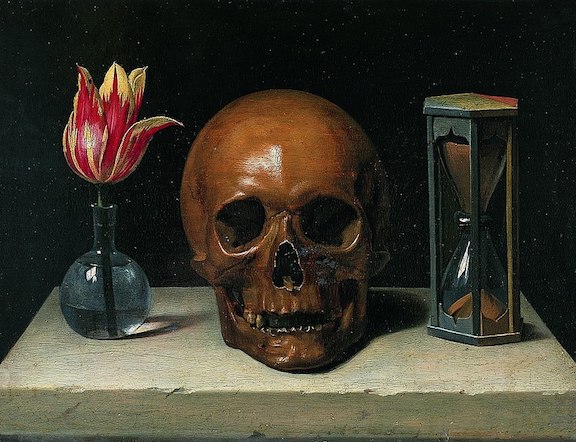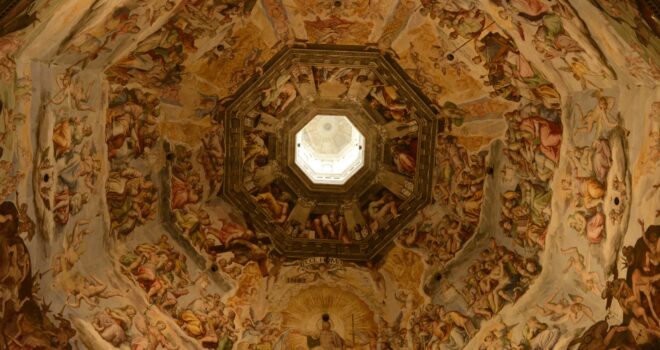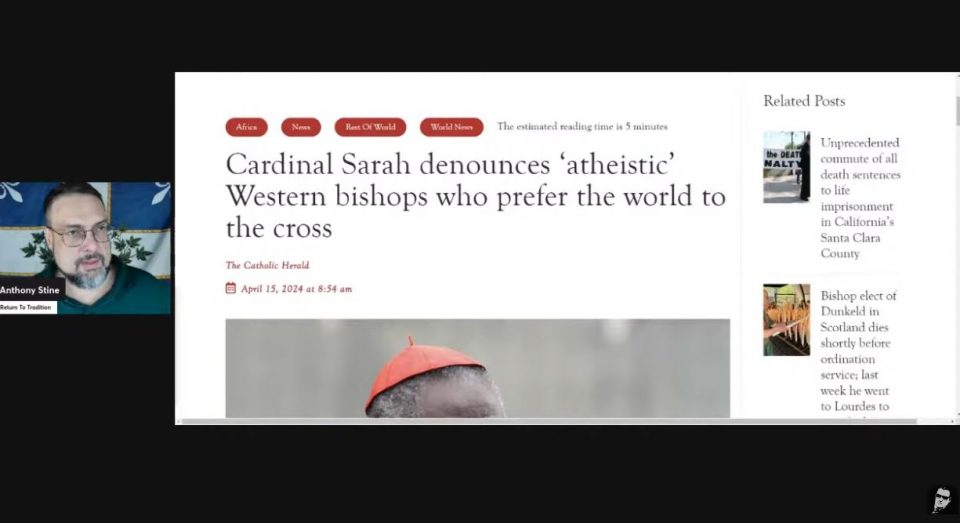The Afterlife

Abortion Activist Cecile Richards Receives Human Rights Award
May 18, 2018
Is the Church a Cruise Ship or a Battleship? (Must see Video)
May 18, 2018
*Image:Vanitas (the essentials: life, death, and time) by Philippe de Campaigne, 1671 [Musée de Tessé, Le Mans, France]
By David Carlin, The Catholic Thing, May 18, 2018
 I suppose the great majority of people who have ever lived have believed in life after death in some form or other. It may not have been a happy life after death they believed in. For instance, Christians and others have believed in an absolutely miserable place where many of us (but not all) will be punished for our sins. Homeric Greeks believed in a dark underworld where almost everybody will go: not a place of punishment but simply a place where the spirits of the dead reside after their earthly lives end. The shade of Achilles gives Odysseus some idea of the misery of Hades by telling him, “I’d rather be a servant in the house of the poorest man on earth than be a king in the underworld.”
I suppose the great majority of people who have ever lived have believed in life after death in some form or other. It may not have been a happy life after death they believed in. For instance, Christians and others have believed in an absolutely miserable place where many of us (but not all) will be punished for our sins. Homeric Greeks believed in a dark underworld where almost everybody will go: not a place of punishment but simply a place where the spirits of the dead reside after their earthly lives end. The shade of Achilles gives Odysseus some idea of the misery of Hades by telling him, “I’d rather be a servant in the house of the poorest man on earth than be a king in the underworld.”
Christians used to believe that some of us (the bad ones) will go to hell while others among us (the good ones) will go to heaven. But in modern America, as far as I can tell, not many people believe in hell. I often read newspaper obituaries that say something like this: “On Wednesday of this week Mr. John Doe, a longtime resident of this city, went to be with Jesus.” I never read anything that says, “On Monday of this week Mary Roe, a local woman who was no better than she had to be, went to live with Satan and other evil spirits.”
And those who believe in hell don’t think it is densely populated. Hitler and Stalin may be there, and perhaps Charles Manson and Attila the Hun. But not many others. Americans seem to be mostly universalists. We find it hard to believe that God, a really nice guy, could be so hard-hearted as to condemn anybody to an eternity of punishment.
I have sometimes thought that if, when I die and approach the seat of judgment, I learn that Hitler and Stalin have gained entry to Paradise thanks to the infinite mercy of God, I will shout “not fair!” and refuse to pass through the heavenly gates. I like it that God is merciful, but I don’t want him to be that merciful.
In our skeptical age, many people do not believe in life after death. When you’re dead, they contend, you’re dead. That’s the end of the story. But how can this be? How can they dissent from the ancient and almost-universal opinion of their fellow human beings that our souls (or ghosts) live on after bodily death?
One reason they offer to justify their disbelief is that this world, the world of material objects, of atoms and molecules and stars and planets, is the only world there is; and if you’re dead in this one and only world, you no longer exist. This seems to me a preposterous belief. Of the billions and billions and billions of possible worlds, why should only one actually exist, the one we happen to live in? That our universe is the only one, that there are no other universes either material or nonmaterial – can anything be more improbable?
Another reason offered by those who disbelieve in life after death is that such a belief is merely wishful thinking. We would, of course, like to think that we ourselves live after death, and even more we’d like to think that our friends and family members live after death. And we’d like to think that Abraham Lincoln and Elvis Presley live after death. Such wishes are only natural, like the wish to win the lottery. But they are only wishes. No more than that.
But wishes often come true. I have wished to have food to eat, a house to live in, a wife to live with, money in my bank account – and many more things. And these wishes have come true. Why shouldn’t my wish for life after death also be realized?
The strongest argument against survival, it seems to me, is that the dead never get in touch with us. Over the years I myself have lost many persons who were very dear to me: my grandparents, my mother and father, my sister, and some of my very best friends. But not one of them has ever contacted me after death. Wouldn’t they get in touch with me to assure me that they are okay? Wouldn’t they from time to time offer me advice and guidance? Wouldn’t they try to push me in the direction of good or hinder me when I was drifting in the direction of evil?
Who can be sure, however, they are not doing this? Below the level of our conscious minds, we have unconscious minds. And below the level of my personal unconscious there may be (as William James once suggested) an impersonal unconscious. My dead family and friends may not be “talking” to me at the level of my conscious mind, but why can’t they be “talking” to me at the level of the unconscious mind?
Many other things happen at the level of unconscious mind. Not just Freudian fears and wishes, but all sorts of creativity – artistic, scientific, mathematical, political, commercial. I read the other day that Mark Twain, in his belief that a novel would write itself (so to speak), took long intermissions in his writing of Huckleberry Finn. Finally, his creative unconscious gave birth to a literary classic.
If one’s unconscious mind can write poetry, paint pictures, solve scientific and mathematical puzzles, etc., why can’t it be the place where we receive messages from the great beyond? For that matter, why can’t God Himself talk to us in our unconscious?
I’m fully aware that this is a dangerous hypothesis. For madmen and fanatics have often imagined that they hear voices. All the same, the hypothesis may be true. Perhaps we really do hear voices – including, quite possibly, the voice of God. At all events, I don’t know how to rule the hypothesis out. God and other spirits may be closer than we think.





